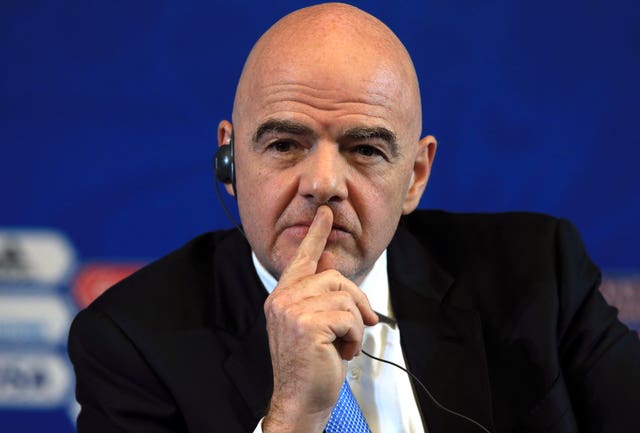Amnesty: Human rights play second fiddle to ‘politics and money’ at FIFA
The 2022 World Cup will begin in three years’ time.

Human rights continue to play second fiddle to “politics and money” at FIFA, according to Amnesty International.
On November 21, 2022 all eyes will be on the Lusail Stadium in Doha as the Qatar World Cup finally gets under way.
With three years to go, Amnesty agrees that the spotlight shone on the country by the World Cup award almost nine years ago has brought about some improvements for migrant workers involved in the construction of stadia and infrastructure.
Football’s world governing body FIFA has faced huge criticism of its decision to take its events to countries with questionable human rights records, such as awarding the World Cup to Qatar back in 2010 and more recently the announcement that an expanded Club World Cup competition would be hosted by China in 2021.
Amnesty International’s deputy director of global issues Stephen Cockburn believes that criticism is justified, even if FIFA has made some modest moves in the right direction.
He told the PA news agency: “As a business they have a responsibility to respect human rights, they are very often not doing the due diligence they need to, or using the power they have to improve human rights in a country.
“With things like the awarding of the Club World Cup to China, the sense that we get is that the human rights policy that FIFA has plays second fiddle to the bigger politics and money around.
“FIFA have come some way, but they have got a really long way to go before they can talk credibly about putting human rights at the centre of their work.”

When asked for a response, Infantino told the PA news agency: “FIFA has a human rights policy and enforces it, and was the first sports organisation in the world to actually adopt one. There are problems everywhere, in many countries of the world.
“It is not the mission of FIFA to solve those problems, but we work hard to have a positive influence – not by attacking or criticising, but by talking and, through football, bringing understanding and helping to foster positive change.
“I was not the FIFA president when Qatar was chosen to host the World Cup, but is the workers’ situation now better or worse? The answer is simple and has been acknowledged by independent human rights bodies – it is better now, it is improving, national laws have been changed, new systems are in place.
“And the reason for that is because football brings issues to the spotlight and together with our member associations we work to advance and progress to the benefit of everyone. For me, there is no doubt that football is helping and contributing to positive change, including and already in Qatar.”
While conditions have improved for migrant workers involved in the construction of World Cup venues, an Amnesty report in September exposed the continued wider problems facing those who come to Qatar from countries such as Nepal and India to work.
Committees set up by the Qatari government that aimed to settle labour disputes in six weeks were found to be working inefficiently.
Some workers interviewed by Amnesty who were chasing payment due from employers were kept waiting months for their cases to be heard, and in many cases they received no payment even when the committee settled in their favour.
Amnesty said a compensation fund to ensure workers were not left out of pocket while they waited for their cases to be settled was still not established, despite promises from the Qatari government more than a year ago that it would be.
He said migrant workers often find themselves in a “desperate situation” compounded by the fact that they often arrive in Qatar with debt, having had to pay local recruitment agencies in their country of origin just to get the work in the first place.
Qatar has promised to reform the ‘kafala’ system which has been criticised for the huge restrictions it places on a migrant worker’s freedom of movement.
It has already abolished the exit permit workers needed from an employer to leave the country for all except those in domestic service, with the government promising to extend it to all migrant workers in due course.
By January 2020 the Qatari government has said it will remove the non-objection certificate migrant workers currently need from an employer to change jobs if they have less than five years’ service with that employer.
But as Cockburn points out, the reforms mean nothing without enforcement.
“The big question in all of these reforms – the exit permit, the other parts of the kafala system, the committees, it’s how they’re implemented on the ground,” he said.
“We have seen real problems in the lack of labour inspections, the lack of enforcement of rules – many workers work extremely long hours and are underpaid, despite there already being existing laws against that in Qatar.
“You can do the reforms, but you need to enforce them, and that’s the next big step.”





